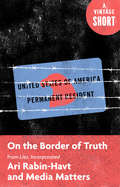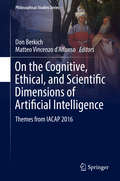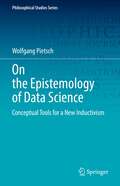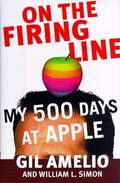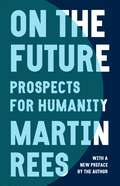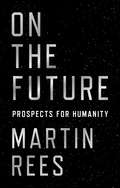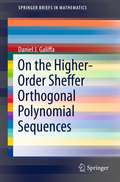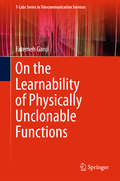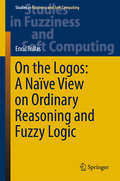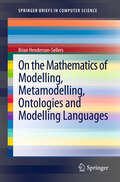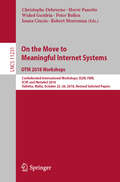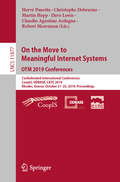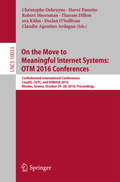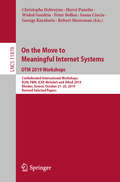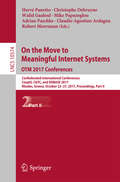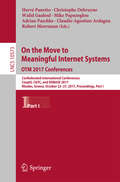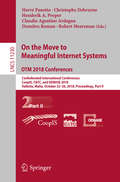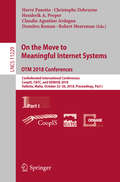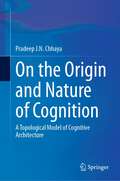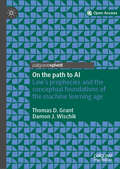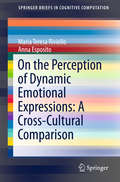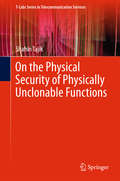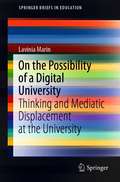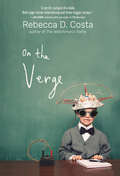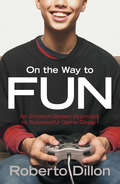- Table View
- List View
On the Border of Truth: From Lies, Incorporated (A Vintage Short)
by Ari Rabin-Havt Media Matters for AmericaIn a post-truth political landscape, there is a carefully concealed but ever-growing industry of organized misinformation that exists to create and disseminate lies in the service of political agendas. This is especially true today for immigration reform, which has become severely limited under President Trump’s first term in office and affecting millions of people’s lives. livelihoods and families. Scrutinizing the dangerous misinformation purveyed by organizations like John Tanton’s The Center of Immigration Studies and others, On the Border of Truth is a powerful look at the organizations and people that have been pushing a coordinated assault on truth for years before the 2016 election. A Vintage Shorts Selection. An ebook short.
On the Cognitive, Ethical, and Scientific Dimensions of Artificial Intelligence: Themes from IACAP 2016 (Philosophical Studies Series #134)
by Don Berkich Matteo Vincenzo D'AlfonsoThis edited volume explores the intersection between philosophy and computing. It features work presented at the 2016 annual meeting of the International Association for Computing and Philosophy. The 23 contributions to this volume neatly represent a cross section of 40 papers, four keynote addresses, and eight symposia as they cut across six distinct research agendas. The volume begins with foundational studies in computation and information, epistemology and philosophy of science, and logic. The contributions next examine research into computational aspects of cognition and philosophy of mind. This leads to a look at moral dimensions of man-machine interaction as well as issues of trust, privacy, and justice. This multi-disciplinary or, better yet, a-disciplinary investigation reveals the fruitfulness of erasing distinctions among and boundaries between established academic disciplines. This should come as no surprise. The computational turn itself is a-disciplinary and no former discipline, whether scientific, artistic, or humanistic, has remained unchanged. Rigorous reflection on the nature of these changes opens the door to inquiry into the nature of the world, what constitutes our knowledge of it, and our understanding of our place in it. These investigations are only just beginning. The contributions to this volume make this clear: many encourage further research and end with open questions.
On the Epistemology of Data Science: Conceptual Tools for a New Inductivism (Philosophical Studies Series #148)
by Wolfgang PietschThis book addresses controversies concerning the epistemological foundations of data science: Is it a genuine science? Or is data science merely some inferior practice that can at best contribute to the scientific enterprise, but cannot stand on its own? The author proposes a coherent conceptual framework with which these questions can be rigorously addressed. Readers will discover a defense of inductivism and consideration of the arguments against it: an epistemology of data science more or less by definition has to be inductivist, given that data science starts with the data. As an alternative to enumerative approaches, the author endorses Federica Russo’s recent call for a variational rationale in inductive methodology. Chapters then address some of the key concepts of an inductivist methodology including causation, probability and analogy, before outlining an inductivist framework. The inductivist framework is shown to be adequate and useful for an analysis of the epistemological foundations of data science. The author points out that many aspects of the variational rationale are present in algorithms commonly used in data science. Introductions to algorithms and brief case studies of successful data science such as machine translation are included. Data science is located with reference to several crucial distinctions regarding different kinds of scientific practices, including between exploratory and theory-driven experimentation, and between phenomenological and theoretical science. Computer scientists, philosophers and data scientists of various disciplines will find this philosophical perspective and conceptual framework of great interest, especially as a starting point for further in-depth analysis of algorithms used in data science.
On the Firing Line: My 500 Days at Apple
by William L. Simon Gil AmelioFormer CEO of Apple Computer Gil Amelio, who was replaced by Steve Jobs in the summer of 1997, now chronicles his 17 months as head of Apple and reveals the inner workings of a company shrouded in myth and mystery. "On the Firing Line" is Gil Amelio's Up Close and Personal story that dares to unmask the personalities behind Apple Computer and lay bare the facts Apple fans don't know. It untangles the issues involved in Apple's desperate search for a CEO, describes how Steve Jobs claimed that Amelio was the only one who could save the company, and then shows how Jobs played a critical role in manipulating the board of directors to fire Amelio. In an engaging style, Amelio explores many of the problems he confronted as CEO and reveals how he constantly suffered a culture clash with the company and its people -- a clash he describes in terms of Brioni suits and oxfords meeting Levi's "TM" and Birkenstocks. A must-have for every Apple fan and computer world aficionado, this candid, often startling book takes readers inside the boardrooms and computer labs to reveal the way things really are at the company that has become an American icon.
On the Future: Prospects for Humanity
by Lord Martin ReesA provocative and inspiring look at the future of humanity and science from world-renowned scientist and bestselling author Martin ReesHumanity has reached a critical moment. Our world is unsettled and rapidly changing, and we face existential risks over the next century. Various outcomes—good and bad—are possible. Yet our approach to the future is characterized by short-term thinking, polarizing debates, alarmist rhetoric, and pessimism. In this short, exhilarating book, renowned scientist and bestselling author Martin Rees argues that humanity’s prospects depend on our taking a very different approach to planning for tomorrow.The future of humanity is bound to the future of science and hinges on how successfully we harness technological advances to address our challenges. If we are to use science to solve our problems while avoiding its dystopian risks, we must think rationally, globally, collectively, and optimistically about the long term. Advances in biotechnology, cybertechnology, robotics, and artificial intelligence—if pursued and applied wisely—could empower us to boost the developing and developed world and overcome the threats humanity faces on Earth, from climate change to nuclear war. At the same time, further advances in space science will allow humans to explore the solar system and beyond with robots and AI. But there is no “Plan B” for Earth—no viable alternative within reach if we do not care for our home planet.Rich with fascinating insights into cutting-edge science and technology, this accessible book will captivate anyone who wants to understand the critical issues that will define the future of humanity on Earth and beyond.
On the Future: Prospects for Humanity
by Martin ReesA provocative and inspiring look at the future of humanity and science from world-renowned scientist and bestselling author Martin ReesHumanity has reached a critical moment. Our world is unsettled and rapidly changing, and we face existential risks over the next century. Various outcomes—good and bad—are possible. Yet our approach to the future is characterized by short-term thinking, polarizing debates, alarmist rhetoric, and pessimism. In this short, exhilarating book, renowned scientist and bestselling author Martin Rees argues that humanity’s prospects depend on our taking a very different approach to planning for tomorrow.The future of humanity is bound to the future of science and hinges on how successfully we harness technological advances to address our challenges. If we are to use science to solve our problems while avoiding its dystopian risks, we must think rationally, globally, collectively, and optimistically about the long term. Advances in biotechnology, cybertechnology, robotics, and artificial intelligence—if pursued and applied wisely—could empower us to boost the developing and developed world and overcome the threats humanity faces on Earth, from climate change to nuclear war. At the same time, further advances in space science will allow humans to explore the solar system and beyond with robots and AI. But there is no “Plan B” for Earth—no viable alternative within reach if we do not care for our home planet.Rich with fascinating insights into cutting-edge science and technology, this accessible book will captivate anyone who wants to understand the critical issues that will define the future of humanity on Earth and beyond.
On the Higher-Order Sheffer Orthogonal Polynomial Sequences
by Daniel J. GaliffaOn the Higher-Order Sheffer Orthogonal Polynomial Sequences sheds light on the existence/non-existence of B-Type 1 orthogonal polynomials. This book presents a template for analyzing potential orthogonal polynomial sequences including additional higher-order Sheffer classes. This text not only shows that there are no OPS for the special case the B-Type 1 class, but that there are no orthogonal polynomial sequences for the general B-Type 1 class as well. Moreover, it is quite provocative how the seemingly subtle transition from the B-Type 0 class to the B-Type 1 class leads to a drastically more difficult characterization problem. Despite this issue, a procedure is established that yields a definite answer to our current characterization problem, which can also be extended to various other characterization problems as well. Accessible to undergraduate students in the mathematical sciences and related fields, This book functions as an important reference work regarding the Sheffer sequences. The author takes advantage of Mathematica 7 to display unique detailed code and increase the reader's understanding of the implementation of Mathematica 7 and facilitate further experimentation. In addition, this book provides an excellent example of how packages like Mathematica 7 can be used to derive rigorous mathematical results.
On the Learnability of Physically Unclonable Functions (T-Labs Series in Telecommunication Services)
by Fatemeh GanjiThis book addresses the issue of Machine Learning (ML) attacks on Integrated Circuits through Physical Unclonable Functions (PUFs). It provides the mathematical proofs of the vulnerability of various PUF families, including Arbiter, XOR Arbiter, ring-oscillator, and bistable ring PUFs, to ML attacks. To achieve this goal, it develops a generic framework for the assessment of these PUFs based on two main approaches. First, with regard to the inherent physical characteristics, it establishes fit-for-purpose mathematical representations of the PUFs mentioned above, which adequately reflect the physical behavior of these primitives. To this end, notions and formalizations that are already familiar to the ML theory world are reintroduced in order to give a better understanding of why, how, and to what extent ML attacks against PUFs can be feasible in practice. Second, the book explores polynomial time ML algorithms, which can learn the PUFs under the appropriate representation. More importantly, in contrast to previous ML approaches, the framework presented here ensures not only the accuracy of the model mimicking the behavior of the PUF, but also the delivery of such a model. Besides off-the-shelf ML algorithms, the book applies a set of algorithms hailing from the field of property testing, which can help to evaluate the security of PUFs. They serve as a “toolbox”, from which PUF designers and manufacturers can choose the indicators most relevant for their requirements. Last but not least, on the basis of learning theory concepts, the book explicitly states that the PUF families cannot be considered as an ultimate solution to the problem of insecure ICs. As such, it provides essential insights into both academic research on and the design and manufacturing of PUFs.
On the Logos: A Naïve View on Ordinary Reasoning and Fuzzy Logic (Studies in Fuzziness and Soft Computing #354)
by Enric TrillasThis book offers an inspiring and naïve view on language and reasoning. It presents a new approach to ordinary reasoning that follows the author’s former work on fuzzy logic. Starting from a pragmatic scientific view on meaning as a quantity, and the common sense reasoning from a primitive notion of inference, which is shared by both laypeople and experts, the book shows how this can evolve, through the addition of more and more suppositions, into various formal and specialized modes of precise, imprecise, and approximate reasoning. The logos are intended here as a synonym for rationality, which is usually shown by the processes of questioning, guessing, telling, and computing. Written in a discursive style and without too many technicalities, the book presents a number of reflections on the study of reasoning, together with a new perspective on fuzzy logic and Zadeh’s “computing with words” grounded in both language and reasoning. It also highlights some mathematical developments supporting this view. Lastly, it addresses a series of questions aimed at fostering new discussions and future research into this topic. All in all, this book represents an inspiring read for professors and researchers in computer science, and fuzzy logic in particular, as well as for psychologists, linguists and philosophers.
On the Mathematics of Modelling, Metamodelling, Ontologies and Modelling Languages
by Brian Henderson-SellersComputing as a discipline is maturing rapidly. However, with maturity often comes a plethora of subdisciplines, which, as time progresses, can become isolationist. The subdisciplines of modelling, metamodelling, ontologies and modelling languages within software engineering e.g. have, to some degree, evolved separately and without any underpinning formalisms. Introducing set theory as a consistent underlying formalism, Brian Henderson-Sellers shows how a coherent framework can be developed that clearly links these four, previously separate, areas of software engineering. In particular, he shows how the incorporation of a foundational ontology can be beneficial in resolving a number of controversial issues in conceptual modelling, especially with regard to the perceived differences between linguistic metamodelling and ontological metamodelling. An explicit consideration of domain-specific modelling languages is also included in his mathematical analysis of models, metamodels, ontologies and modelling languages. This encompassing and detailed presentation of the state-of-the-art in modelling approaches mainly aims at researchers in academia and industry. They will find the principled discussion of the various subdisciplines extremely useful, and they may exploit the unifying approach as a starting point for future research.
On the Move to Meaningful Internet Systems: Confederated International Workshops: EI2N, FBM, ICSP, and Meta4eS 2018, Valletta, Malta, October 22–26, 2018, Revised Selected Papers (Lecture Notes in Computer Science #11231)
by Christophe Debruyne Hervé Panetto Wided Guédria Peter Bollen Ioana Ciuciu Robert MeersmanThis volume constitutes the refereed proceedings of the Confederated International International Workshop on Enterprise Integration, Interoperability and Networking (EI2N ), Fact Based Modeling ( FBM), Industry Case Studies Program ( ICSP ), and International Workshop on Methods, Evaluation, Tools and Applications for the Creation and Consumption of Structured Data for the e-Society (Meta4eS), held as part of OTM 2018 in October 2018 in Valletta, Malta.As the three main conferences and the associated workshops all share the distributed aspects of modern computing systems, they experience the application pull created by the Internet and by the so-called Semantic Web, in particular developments of Big Data, increased importance of security issues, and the globalization of mobile-based technologies.
On the Move to Meaningful Internet Systems: Confederated International Conferences: CoopIS, ODBASE, C&TC 2019, Rhodes, Greece, October 21–25, 2019, Proceedings (Lecture Notes in Computer Science #11877)
by Christophe Debruyne Hervé Panetto Robert Meersman Claudio Agostino Ardagna Dave Lewis Martin HeppThis volume LNCS 11877 constitutes the refereed proceedings of the Confederated International Conferences: Cooperative Information Systems, CoopIS 2019, Ontologies, Databases, and Applications of Semantics, ODBASE 2019, and Cloud and Trusted Computing, C&TC, held as part of OTM 2019 in October 2019 in Rhodes, Greece. The 38 full papers presented together with 8 short papers were carefully reviewed and selected from 156 submissions. The OTM program every year covers data and Web semantics, distributed objects, Web services, databases, informationsystems, enterprise workflow and collaboration, ubiquity, interoperability, mobility, grid and high-performance computing.
On the Move to Meaningful Internet Systems: OTM 2016 Conferences
by Christophe Debruyne Hervé Panetto Robert Meersman Tharam Dillon Eva Kühn Declan O'Sullivan Claudio Agostino ArdagnaThis volume constitutes the refereed proceedings of the Confederated International Conferences: Cooperative Information Systems, CoopIS 2016, Ontologies, Databases, and Applications of Semantics, ODBASE 2016, and Cloud and Trusted Computing, C&TC, held as part of OTM 2016 in October 2016 in Rhodes, Greece. The 45 full papers presented together with 16 short papers were carefully reviewed and selected from 133 submissions. The OTM program every year covers data and Web semantics, distributed objects, Web services, databases, information systems, enterprise work ow and collaboration, ubiquity, interoperability, mobility, grid and high-performance computing.
On the Move to Meaningful Internet Systems: Confederated International Workshops: EI2N, FBM, ICSP, Meta4eS and SIAnA 2019, Rhodes, Greece, October 21–25, 2019, Revised Selected Papers (Lecture Notes in Computer Science #11878)
by Wided Guédria George Karabatis Christophe Debruyne Hervé Panetto Robert Meersman Ioana Ciuciu Peter BollenThis volume constitutes the refereed proceedings of the Confederated International International Workshop on Enterprise Integration, Interoperability and Networking (EI2N ), Fact Based Modeling ( FBM), Industry Case Studies Program ( ICSP ), International Workshop on Methods, Evaluation, Tools and Applications for the Creation and Consumption of Structured Data for the e-Society (Meta4eS) and, 1st International Workshop on Security via Information Analytics and Applications (SIAnA 2019) held as part of OTM 2018 in October 2019 in Rhodes, Greece.As the three main conferences and the associated workshops all share the distributed aspects of modern computing systems, they experience the application pull created by the Internet and by the so-called Semantic Web, in particular developments of Big Data, increased importance of security issues, and the globalization of mobile-based technologies.
On the Move to Meaningful Internet Systems. OTM 2017 Conferences: Confederated International Conferences: CoopIS, C&TC, and ODBASE 2017, Rhodes, Greece, October 23-27, 2017, Proceedings, Part II (Lecture Notes in Computer Science #10574)
by Hervé Panetto, Christophe Debruyne, Walid Gaaloul, Mike Papazoglou, Adrian Paschke, Claudio Agostino Ardagna and Robert MeersmanThis double volumes LNCS 10573-10574 constitutes the refereed proceedings of the Confederated International Conferences: Cooperative Information Systems, CoopIS 2017, Ontologies, Databases, and Applications of Semantics, ODBASE 2017, and Cloud and Trusted Computing, C&TC, held as part of OTM 2017 in October 2017 in Rhodes, Greece.The 61 full papers presented together with 19 short papers were carefully reviewed and selected from 180 submissions. The OTM program every year covers data and Web semantics, distributed objects, Web services, databases, information systems, enterprise workflow and collaboration, ubiquity, interoperability, mobility, grid and high-performance computing.
On the Move to Meaningful Internet Systems. OTM 2017 Conferences: Confederated International Conferences: CoopIS, C&TC, and ODBASE 2017, Rhodes, Greece, October 23-27, 2017, Proceedings, Part I (Lecture Notes in Computer Science #10573)
by Hervé Panetto, Christophe Debruyne, Walid Gaaloul, Mike Papazoglou, Adrian Paschke, Claudio Agostino Ardagna and Robert MeersmanThis double volumes LNCS 10573-10574 constitutes the refereed proceedings of the Confederated International Conferences: Cooperative Information Systems, CoopIS 2017, Ontologies, Databases, and Applications of Semantics, ODBASE 2017, and Cloud and Trusted Computing, C&TC, held as part of OTM 2017 in October 2017 in Rhodes, Greece.The 61 full papers presented together with 19 short papers were carefully reviewed and selected from 180 submissions. The OTM program every year covers data and Web semantics, distributed objects, Web services, databases, information systems, enterprise workflow and collaboration, ubiquity, interoperability, mobility, grid and high-performance computing.
On the Move to Meaningful Internet Systems. OTM 2018 Conferences: Confederated International Conferences: CoopIS, C&TC, and ODBASE 2018, Valletta, Malta, October 22-26, 2018, Proceedings, Part II (Lecture Notes in Computer Science #11230)
by Hervé Panetto Christophe Debruyne Henderik A. Proper Claudio Agostino Ardagna Dumitru Roman Robert MeersmanThis double volumes LNCS 11229-11230 constitutes the refereed proceedings of the Confederated International Conferences: Cooperative Information Systems, CoopIS 2018, Ontologies, Databases, and Applications of Semantics, ODBASE 2018, and Cloud and Trusted Computing, C&TC, held as part of OTM 2018 in October 2018 in Valletta, Malta. The 64 full papers presented together with 22 short papers were carefully reviewed and selected from 173 submissions. The OTM program every year covers data and Web semantics, distributed objects, Web services, databases, informationsystems, enterprise workflow and collaboration, ubiquity, interoperability, mobility, grid and high-performance computing.
On the Move to Meaningful Internet Systems. OTM 2018 Conferences: Confederated International Conferences: CoopIS, C&TC, and ODBASE 2018, Valletta, Malta, October 22-26, 2018, Proceedings, Part I (Lecture Notes in Computer Science #11229)
by Hervé Panetto Christophe Debruyne Henderik A. Proper Claudio Agostino Ardagna Dumitru Roman Robert MeersmanThis double volumes LNCS 11229-11230 constitutes the refereed proceedings of the Confederated International Conferences: Cooperative Information Systems, CoopIS 2018, Ontologies, Databases, and Applications of Semantics, ODBASE 2018, and Cloud and Trusted Computing, C&TC, held as part of OTM 2018 in October 2018 in Valletta, Malta. The 64 full papers presented together with 22 short papers were carefully reviewed and selected from 173 submissions. The OTM program every year covers data and Web semantics, distributed objects, Web services, databases, informationsystems, enterprise workflow and collaboration, ubiquity, interoperability, mobility, grid and high-performance computing.
On the Origin and Nature of Cognition: A Topological Model of Cognitive Architecture
by Pradeep J.N. ChhayaThis monograph is an extension of the earlier monographs dealing with the application of the new modified involuted manifold model. This monograph has two objectives. Firstly, it seeks to integrate neuronal organization with cognitive functionalities. Secondly, it tries to formalize a structural template of cognitive functionalities. It is based on the postulate that cognitive functionalities are essentially natural phenomena and therefore amenable to formal naturalistic description. Therefore, it employs a topological model of spacetime proposed earlier to define a new framework wherein neuronal networks occupy the four-dimensional configurations of spacetime, and cognitive functionalities occupy higher dimensional configurations of spacetime. Using the Darwinian conception of natural selection, the monograph outlines a model of natural selection operating at more than one level. Thus, natural selection at the four-dimensional configurations of spacetime leads to structural agnosticism so prevalent in neuronal organization. At the same time, natural selection at the higher dimensional configurations of spacetime leads to natural selection of cognitive functionalities. Since the proposed model offers a new computational paradigm formalized in another monograph, this monograph provides a new way to formalize cognitive computations.
On the path to AI: Law’s prophecies and the conceptual foundations of the machine learning age
by Thomas D. Grant Damon J. WischikThis open access book explores machine learning and its impact on how we make sense of the world. It does so by bringing together two ‘revolutions’ in a surprising analogy: the revolution of machine learning, which has placed computing on the path to artificial intelligence, and the revolution in thinking about the law that was spurred by Oliver Wendell Holmes Jr in the last two decades of the 19th century. Holmes reconceived law as prophecy based on experience, prefiguring the buzzwords of the machine learning age—prediction based on datasets.On the path to AI introduces readers to the key concepts of machine learning, discusses the potential applications and limitations of predictions generated by machines using data, and informs current debates amongst scholars, lawyers and policy makers on how it should be used and regulated wisely. Technologists will also find useful lessons learned from the last 120 years of legal grappling with accountability, explainability, and biased data.
On the Perception of Dynamic Emotional Expressions: A Cross-cultural Comparison
by Maria Teresa Teresa Riviello Anna EspositoThis work explores the power of visual and vocal channels, in conveying emotional cues exploiting realistic, dynamic and mutually related emotional vocal and facial stimuli, and aims to report on a cross cultural comparison on how people from different Western Countries perceive emotional dynamic stimuli. The authors attempt to give an answer to the following questions evaluating the subjective perception of emotional states in the single (either visual or auditory channel) and the combined channels: - In a body-to-body interaction, the addressee exploits both the verbal and non-verbal communication modes to infer the speaker's emotional state. Is such an informational content redundant? - Is the amount of information conveyed by each communication mode the same or is it different? - How much information about the speaker's emotional state is conveyed by each mode and is there a preferential communication mode for a given emotional state? -To what extent the cultural specificity affect the decoding of the emotional information? The results are interpreted in terms of cognitive load, language expertise and stimulus dynamics. This book will be of interest to researchers and scholars in the field of Human Computer Interaction, Affective Computing, Psychology, Social Sciences .
On the Physical Security of Physically Unclonable Functions (T-Labs Series in Telecommunication Services)
by Shahin TajikThis book investigates the susceptibility of intrinsic physically unclonable function (PUF) implementations on reconfigurable hardware to optical semi-invasive attacks from the chip backside. It explores different classes of optical attacks, particularly photonic emission analysis, laser fault injection, and optical contactless probing. By applying these techniques, the book demonstrates that the secrets generated by a PUF can be predicted, manipulated or directly probed without affecting the behavior of the PUF. It subsequently discusses the cost and feasibility of launching such attacks against the very latest hardware technologies in a real scenario. The author discusses why PUFs are not tamper-evident in their current configuration, and therefore, PUFs alone cannot raise the security level of key storage. The author then reviews the potential and already implemented countermeasures, which can remedy PUFs’ security-related shortcomings and make them resistant to optical side-channel and optical fault attacks. Lastly, by making selected modifications to the functionality of an existing PUF architecture, the book presents a prototype tamper-evident sensor for detecting optical contactless probing attempts.
On the Possibility of a Digital University: Thinking and Mediatic Displacement at the University (SpringerBriefs in Education)
by Lavinia MarinThis book proposes a philosophical exploration of the educational role that media plays in university study practices, with a focus on the practices of lecturing and academic writing. Are the media employed in university study practices mere accessories, or rather constitutive of these practices? While this seems to be a purely theoretical question, its practical implications are wide and concern whether such a thing as a ‘digital university’ is possible. The 'digital university' has been, for a long time, a theoretical construct. However, in the aftermath of the Covid-19 pandemic, moving the university into the digital realm has become a necessity. The difficulties in transitioning to an online university during the 2020 pandemic showed the increased urgency of the questions explored in this book.The book describes lecturing and academic writing through the lens of a phenomenology of gestures and arrives at a description of the experience of university thinking as expanding the subject’s range of experiences about the world and about one’s modes of thinking about the world. The media configuration characteristic for university study practices is a movement of rendering inoperative one medium through another medium so that thinking can emerge, a movement called ‘mediatic displacement’. The question of the digital university becomes then a question whether mediatic displacement is possible on a digital screen. Although this is conceivable, digital technologies are still relatively new, and we are not used to playing with them in a profanatory way as the book discusses through the example of videoconferencing and MOOCs. The promise of the digital university seems to remain utopian until we figure out how to enact the techniques of mediatic displacement currently flourishing at the physical university.Both emerging and established researchers will benefit from this book since it offers an alternative way of discussing the possibility of a digital transformation of the university, starting from a phenomenology of gestures and an understanding of thinking as a collective experience of potentiality and profanation at the same time. By combining two perspectives, media-theoretical and educational-philosophical, this book show a new way of understanding what makes a university and, thus, contributes to the emerging debate on the digital university.
On the Verge
by Rebecca D. CostaThe author of The Watchman&’s Rattle &“has done it again. On the Verge shows how predictive technologies and science are redefining modern leadership&” (George Mitchell, former Senate Majority Leader). &“There can be no greater advantage than certainty of the future. Not in nature. Not in business. Not in governance.&” So begins Rebecca Costa&’s much-awaited exploration of foresight: &“the crowning achievement of human ambition.&” According to Costa, advances in Big Data, predictive analytics, genomics, artificial intelligence, and other breakthroughs have made it possible to pinpoint future results with mind-blowing accuracy—cracking the door to what Costa calls predaptation: the ability to adapt before the fact. Never before has the information needed to avert danger, get the jump ahead of others, or prepare for the inevitable been so clearly within grasp. Through fascinating real-life examples, Costa reveals how technology has brought nations, businesses, and individuals to the edge of clairvoyance. Yet, our ability to act on foreknowledge often falls short—causing leaders to squander the advantage of preemption. To counteract this failure, Costa illuminates 12 principles of adaptation, and predaptation, used to succeed in fast-moving environments. In the spirit of the best in popular science, On the Verge is a landmark examination of big-picture forces affecting society today. Costa&’s unique sociobiological perspective, combined with her ability to blend humor, breaking science, and insightful personal stories, distinguishes her as one of the most important thought leaders of our time. &“If you have an insatiable curiosity about the impact of innovation on our world ahead and how the future can be manipulated, you will love this book.&”—John Sculley, former CEO of Apple and President of Pepsi-Cola
On the Way to Fun: An Emotion-Based Approach to Successful Game Design
by Roberto DillonHow can video games be fun and immerse players in fantastic worlds where anything seems possible? How can they be so engaging to have become the main entertainment product for children and adults alike? In On the Way to Fun, the author proposes a possible answer to these questions by going back to the roots of gaming and showing how early games, as
